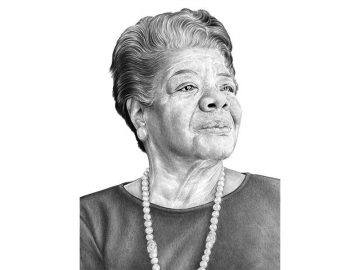Veronica Chambers in Smithsonian:
 Maya Angelou published the first of her seven memoirs not long after she distinguished herself as the star raconteur at a dinner party. “At the time, I was really only concerned with poetry, though I had written a television series,” she would recall. James Baldwin, the novelist and activist, took her to the party, which was at the home of the cartoonist-writer Jules Feiffer and his then-wife, Judy. “We enjoyed each other immensely and sat up until 3 or 4 in the morning, drinking Scotch and telling tales,” Angelou went on. “The next morning, Judy Feiffer called a friend of hers at Random House and said, ‘You know the poet Maya Angelou? If you could get her to write a book…’” That book became I Know Why the Caged Bird Sings, which recently celebrated its 50th birthday. In the memoir, Angelou (born Marguerite Johnson) boldly told the heartbreaking truths of her childhood, including how she was raped at the age of 7 by her mother’s boyfriend. She would later explain, “I stopped speaking for five years. In those five years, I read every book in the black school library. When I decided to speak, I had a lot to say.”
Maya Angelou published the first of her seven memoirs not long after she distinguished herself as the star raconteur at a dinner party. “At the time, I was really only concerned with poetry, though I had written a television series,” she would recall. James Baldwin, the novelist and activist, took her to the party, which was at the home of the cartoonist-writer Jules Feiffer and his then-wife, Judy. “We enjoyed each other immensely and sat up until 3 or 4 in the morning, drinking Scotch and telling tales,” Angelou went on. “The next morning, Judy Feiffer called a friend of hers at Random House and said, ‘You know the poet Maya Angelou? If you could get her to write a book…’” That book became I Know Why the Caged Bird Sings, which recently celebrated its 50th birthday. In the memoir, Angelou (born Marguerite Johnson) boldly told the heartbreaking truths of her childhood, including how she was raped at the age of 7 by her mother’s boyfriend. She would later explain, “I stopped speaking for five years. In those five years, I read every book in the black school library. When I decided to speak, I had a lot to say.”
One of the women who helped Angelou find her voice was a teacher in Stamps, Arkansas, named Bertha Flowers. She was the kind of woman you rarely got to read about in American literature in the 1960s. Angelou’s writing is cinematic; in Caged Bird, she transports the reader to another time:
Mrs. Bertha Flowers was the aristocrat of Black Stamps. She had the grace of control to appear warm in the coldest weather, and on the Arkansas summer days it seemed like she had a private breeze which swirled around, cooling her. She was thin without the taut look of wiry people and her printed voile dresses and flowered hats were as right for her as denim overalls for a farmer. She was our side’s answer to the richest white woman in town.
It is all there—life, not just in the American South but this American life, period—waiting for you to take the ride, the heartbreaking and brave journey that is Marguerite Johnson’s young life.
More here.
